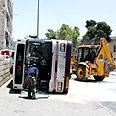
Moshe Elad

Scene of Wednesday's attack
Photo: Gil Yohanan
In July 1989, a 25-year-old member of Islamic Jihad from Gaza boarded the Route 405 bus from Tel Aviv to Jerusalem. During the trip, the terrorist quickly walked up to the driver and pulled the wheel to the right, driving the bus into the abyss – 16 people were murdered in this disaster. The attack’s nature and modus operandi constituted a complete surprise for intelligence and security officials. We were “surprised” by the boldness and simplicity of the idea.
Wednesday’s terror attack, where a terrorist driving a bulldozer plowed into pedestrians and vehicles in Jerusalem, should not have come as a surprise. Certain elements within Israel’s defense establishment do not have the privilege of being surprised. Security and intelligence officials are familiar with the idea of a terror attack using a bulldozer. Only a few weeks ago, a similar attack was thwarted when Givati troops deployed near Gaza identified the terror bid on time and prevented mass casualties.
There is no doubt that ever since the security fence’s expansion and the upgrading of IDF operations, alongside the upgraded counter-terrorism measures deployed by the Shin Bet and Israel Police, terror groups have been facing true distress. The many terror warnings vis-à-vis the few successful attacks are an excellent indicator of the highly developed anti-terror capabilities possessed by our forces. Even though terror groups have access to suicide bombers, the inability of those murderers to receive industrial explosives (what in professional terms is referred to as “connecting the terrorist with the explosive material”) created an impression of relative quiet.
However, as we know, “relative quiet” is a recipe for complacency and lack of creativity. The establishment entrusted with maintaining security in Jerusalem had to take into account the possibility of an unconventional attack that may utilize a large vehicle. It is well known that the motivation of terror groups has not declined or ceased, and a modus operandi requiring meager or unconventional means was only a matter of time.
One cannot hide behind defense establishment responses such as “there was no concrete or specific warning.” As not to play into the hands of terror groups, I shall refrain from making note of various other simple mass murder ideas that must be taken into account. I’m convinced that these types of attack are not in the range of “concrete and specific.”
Expect the unexpected
It is clear to everyone that terror organizations do not rest for a moment while seeking to identify even the slightest crack in the defensive wall around our borders, and particularly around Jerusalem. About 20 years ago, when security officials in Jerusalem were expecting a terrorist with a bomb in his car, the terrorist outsmarted our forces and arrived as a regular unarmed passenger, a fact that did not stop him from turning a whole bus into a killing zone.On Wednesday, police and soldiers in the capital were again preparing for yesterday’s attack, not the one that shall come tomorrow. They expected the next suspicious vehicle, but instead, a terrorist and a bulldozer coming out of an innocent looking construction zone downtown created another successful Palestinian attack.
The ease with which the bulldozer attack was carried out, the low price paid by the organization behind it, and the “holes” and vulnerabilities often discovered around Jerusalem require the defense establishment to better prepare for thwarting such surprises.
Indeed, the defense establishment should stop using the phrase “we were surprised” – in the wake of the latest Palestinian success story, this is needed more than ever.
Colonel (res.) Moshe Elad served in various posts in the territories and currently researches Palestinian society at the Shmuel Neeman Institute at the Technion. He also serves as a lecturer at the Western Galilee Academic College.















